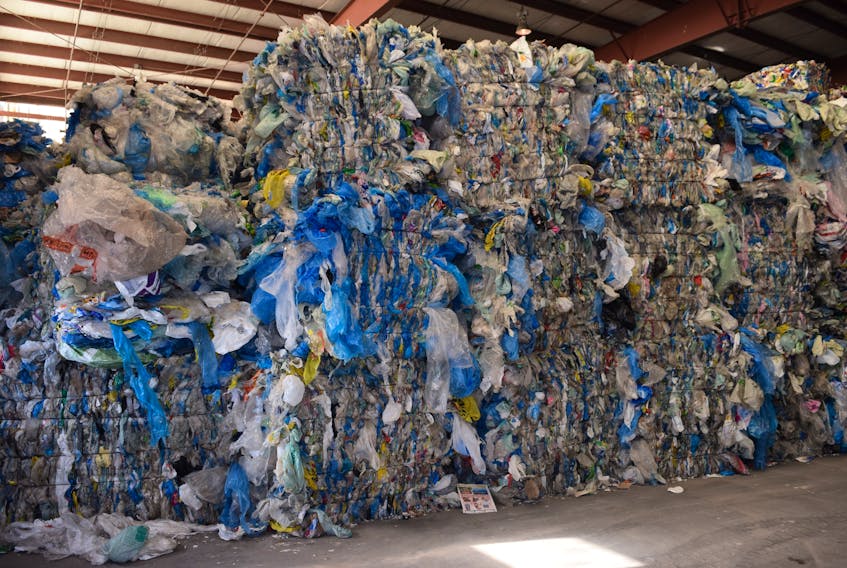A stockpile of plastic at the Materials Recovery Facility (MRF) in Kemptown has reached the point where it now has to be stored outdoors.
“It’s a great concern for me,” said Solid Waste director Wayne Wamboldt, who said there are at least 20 truckloads of primarily plastic grocery bags accumulated at the facility.
The Municipality of Colchester, and others across the country and beyond, have been forced to stockpile the materials since July when the Chinese government announced a ban on imports of 24 categories of recyclables and solid waste, including waste plastics, by the end of 2017.
The Nova Scotia government does not allow the waste plastic to be landfilled so municipalities are stuck without a solution for disposing of the growing stockpiles.
Halifax Regional Municipality was recently granted a temporary exemption from the Department of Environment to allow film plastic to go to a landfill but so far, that is the only municipality to receive such permission.
Wamboldt said he has also written to the province for a similar exemption but has yet to receive word on the request.
“I’m hoping to get a response back very quickly about us being able to put it the landfill temporarily,” he said. “The province has to understand this (situation). It’s nice be green and environmentally friendly but at what expense? And I consider myself an environmentalist.”
Until its decision to no longer accept film plastics from outside its borders China had been the only available market for the material.
Wamboldt said the municipality had previously been contacted by Lafarge Canada to discuss the possibility of accepting its low-value plastics as feed stock for its kiln in the Brookfield plant.
But that interest appeared to wane, he said, as Lafarge moved closer to getting permission from the provincial government to burn used tires in its kiln.
Lafarge spokeswoman Karine Cousineau said the plant has yet to begin burning tires as part of a one-year pilot project as it is still requires an Industrial Approval from the province.
But she said the plant does have “very successful, multi-year experience” of safely using non-recyclable plastics to replace coal and/or petcoke at the Brookfield. That material is coming from a Nova Scotia based supplier, she said.
But in order to be able to use those plastics as low-carbon fuel, it requires a certain amount of processing to make it into a high-quality fuel. And while Lafarge has invested heavily in the past few years at the Brookfield plant in order to be able to use that fuel, a necessary first step is required by a supplier to “chip” the material into small pieces of between a ¼ inch and an inch in size.
“Processing requires state-of-the-art machinery to transform the plastic into high quality fuel,” she said.
Wamboldt said that aspect was never discussed with him when Lafarge initially inquired about accessing the county’s waste plastics.
And he said once the plastic is stored outside, it is no longer marketable in any fashion.
Wamboldt said it is imperative for both the federal and provincial governments to take responsibility with the issue and work towards finding a long-term solution for disposal of the materials. And, preferably, without doing so in a manner that requires further financial downloading onto the municipal units.
Environment spokeswoman Heather Fairbairn recently told the Daily News that the department is “aware of the market challenges created by Chinese import restrictions and we are reviewing the matter.”









